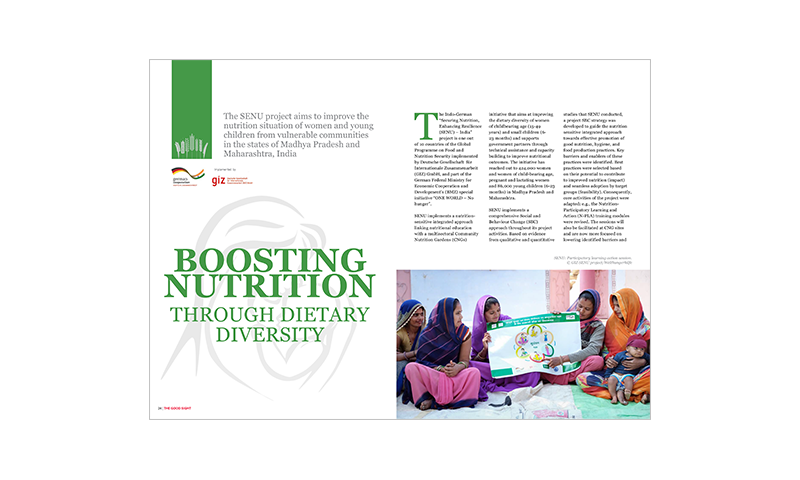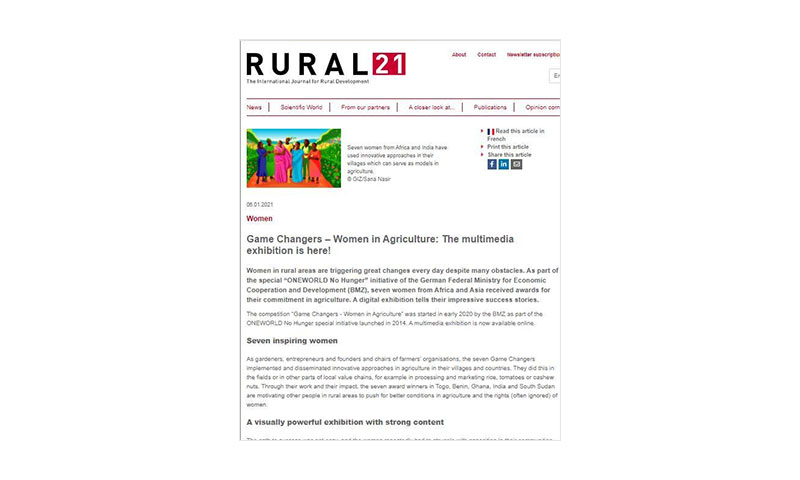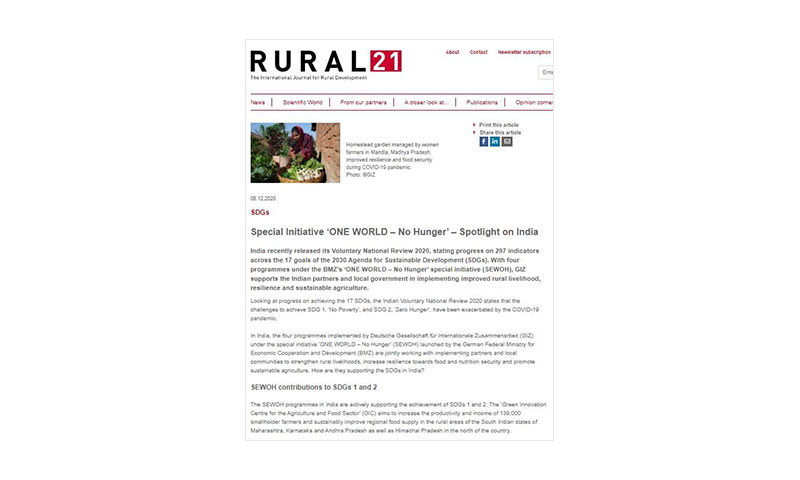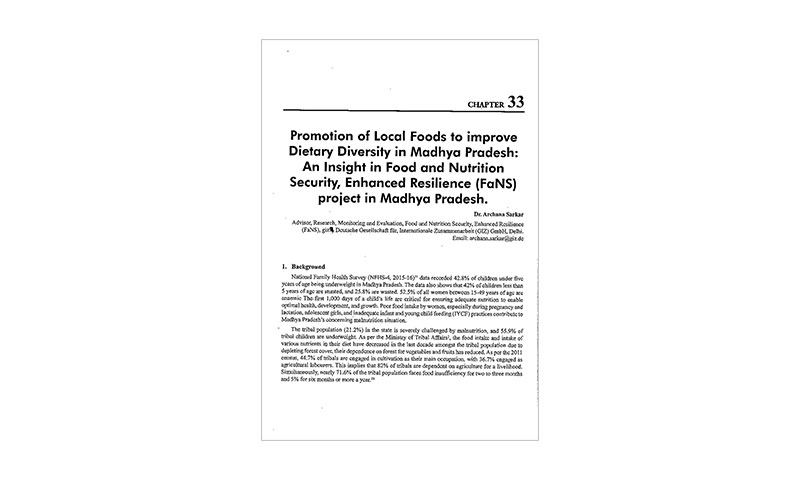Securing Nutrition, Enhancing Resilience – India
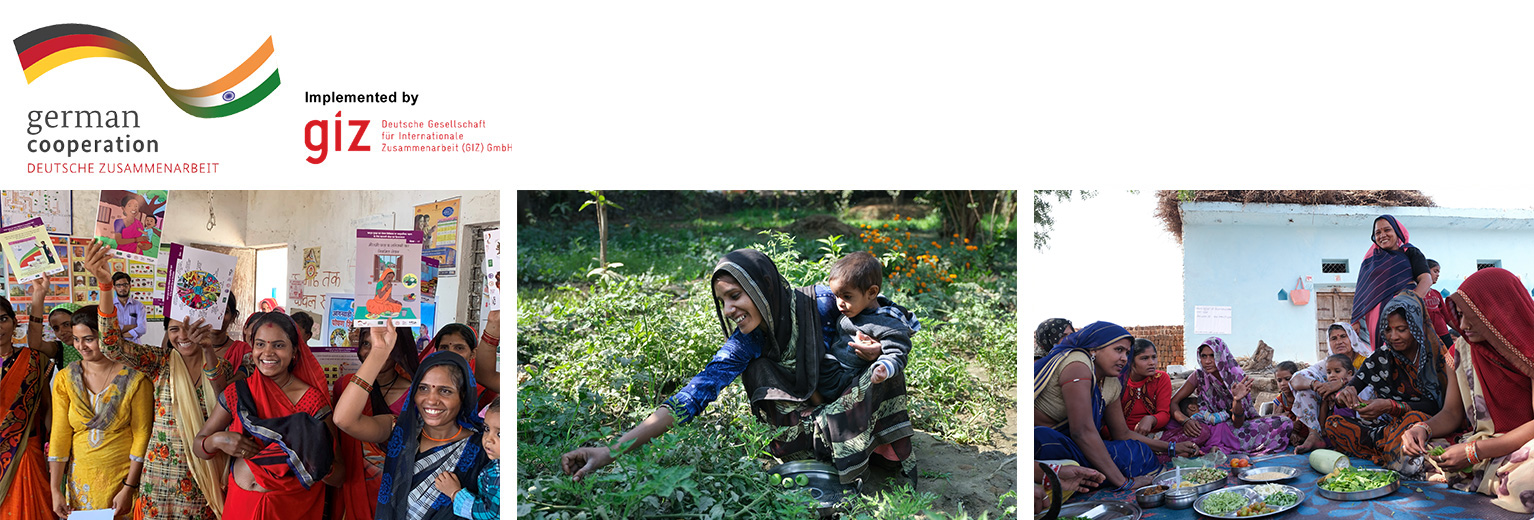
OBJECTIVE
Securing Nutrition, Enhancing Resilience (SENU) – India’ is an Indo-german development cooperation project implemented by the Deutsche Gesellschaft für Internationale Zusammenarbeit (GIZ) GmbH in cooperation with the Ministry of Women and Child Development (MWCD), Government of India. The project is part of global programme being implemented in 10 countries including India. The programme is part of the Special Initiative “Transformation of Agricultural and Food Systems” (SI AGER) by the German Federal Ministry for Economic Cooperation and Development (BMZ) and is co-financed by the Bill & Melinda Gates Foundation
The project aims to improve the nutrition situation of 424,000 women of child-bearing age, pregnant and lactating women, and 86,000 young children (6-23 months) from vulnerable communities in the states of Madhya Pradesh and Maharashtra, India.
- Phase 2 (2021 – 2025): 280,000 women and 56,000 young children
- Phase 1 (2015 – 2020): 144,000 women and 30,000 young children
WHAT WE DO
The fields of action for the second phase (2021-2025) are:
- Improving nutrition and hygiene knowledge and practices
- Upscaling Social Behaviour Change (SBC) driven Nutrition-Participatory Learning and Action (N-PLA) approach
- Technical assistance to implement SBC tools and techniques
- Piloting of Positive Deviance approach
- Diversifying food production and income
- Upscaling a multi-sectoral community nutrition garden approach along with homestead nutrition gardens (Poshan Vatika)
- Strengthening nutrition governance and institutionalisation of good practices
- Systematic capacity building support to frontline workers of governmental partners
- Adolescent skilling
- Digital solutions to bridge supply chain gaps in nutrition-sensitive social protection systems
- Research, Monitoring and Evaluation
- South-south and national exchange and cooperation to disseminate successful knowledge products
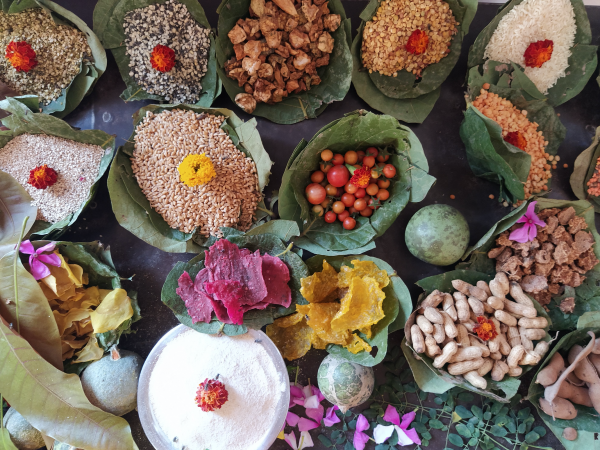
Phase 1 (2015-2020):
- Reforms of Public Distribution System
- Improvement of nutrition and hygiene practices
- Knowledge management and institutionalisation of activities
PARTNERS
Phase 2 (2021-2025)
National Level:
- Ministry of Women and Child Development
State Level:
- Department of Women and Child Development in Madhya Pradesh and Maharashtra
- MGNREGA Department, Madhya Pradesh
- NABARD, Maharashtra
Implementation partners:
- Welthungerhilfe India
- NGO partners:
- Darshana Mahila Kalyan Samiti, Chhatarpur
- Mahatma Gandhi Seva Ashram, Sheopur
- PAHAL, Barwani
- SPANDAN, Samaj Sewa Samiti, Khandwa
- Swayan Shikshan Prayog, Washim
- Development Support Centre, Nandurbar
- SRIJAN
- HARSHA TRUST
- Pradan
- Jhpiego Corporation, Affiliate of John Hopkins University
Phase 1 (2015-2020):
National Level:
- Ministry of Consumer Affairs, Food and Public Distribution (MoCAF&PD)
State Level:
- Department of Food and Public Distribution, Government of Madhya Pradesh
- Department of Women and Child Development, Government of Madhya Pradesh
Implementation partners:
- Welthungerhilfe India
- Darshana Mahila Kalyan Samiti
- Mahatma Gandhi Seva Ashram
- Parmarth
LOCATION
- Sheopur, Chhatarpur, Barwani and Khandwa districts, Madhya Pradesh, India
- Nandurbar and Washim districts, Maharashtra, India
Maharashtra

Madhya Pradesh
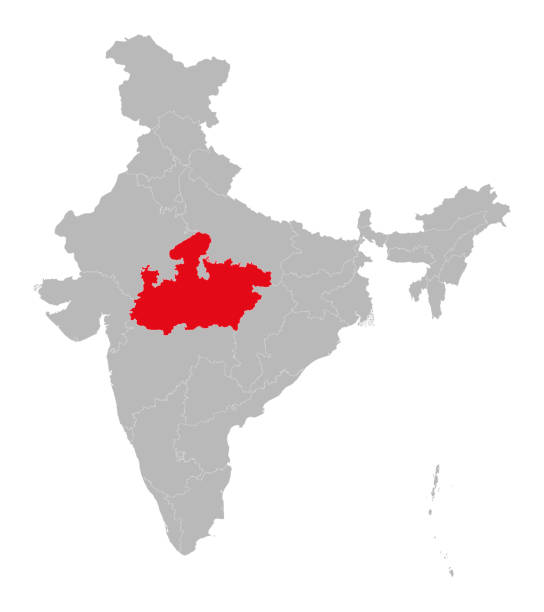
PROJECT EXPERTISE TO IMPROVE NUTRITION SITUATION
- Capacity Development
- Social Behaviour Change
- Gender
- Community-based Development
- Digitisation
- Research, M&E, Evaluative Thinking
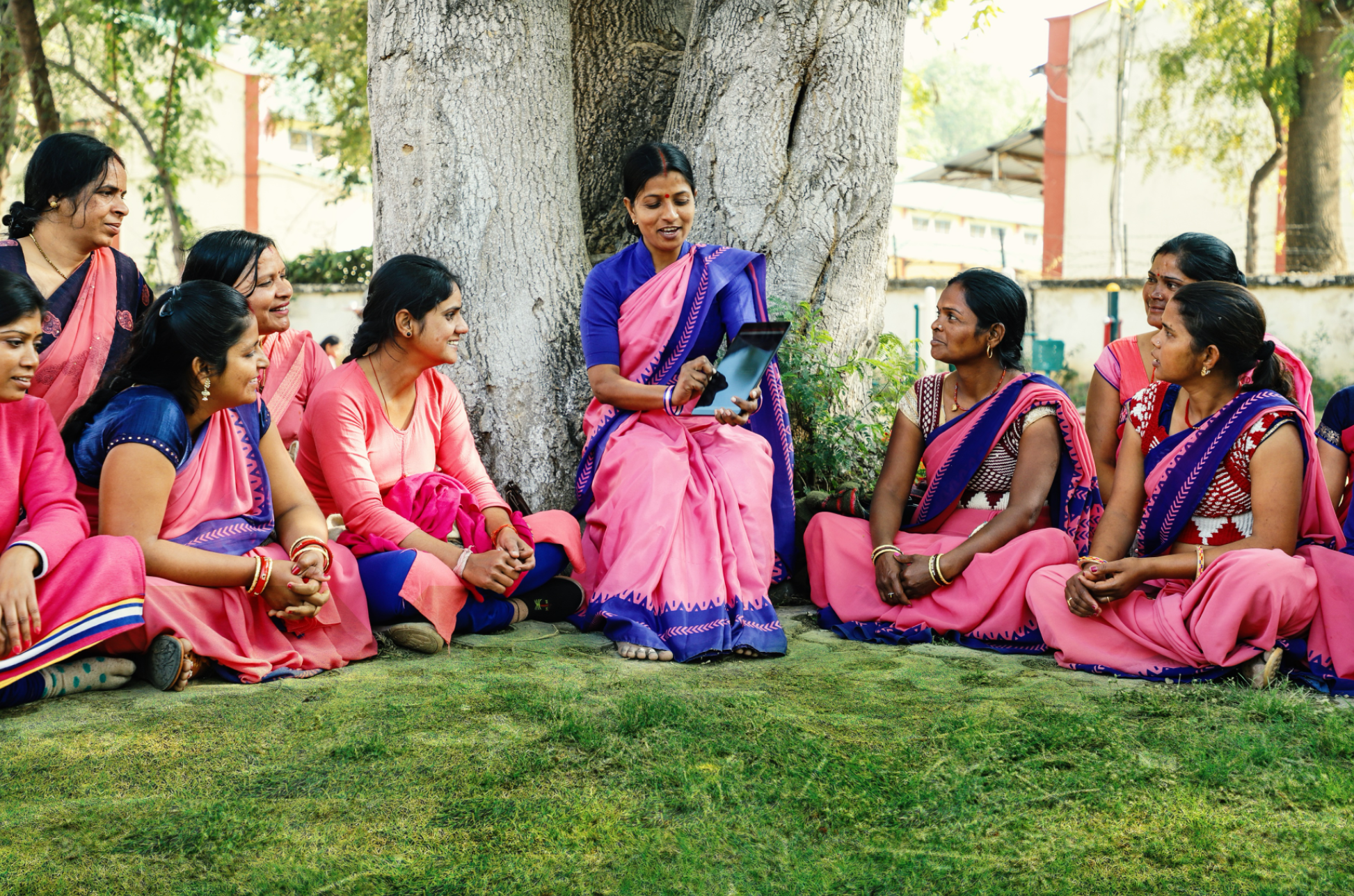
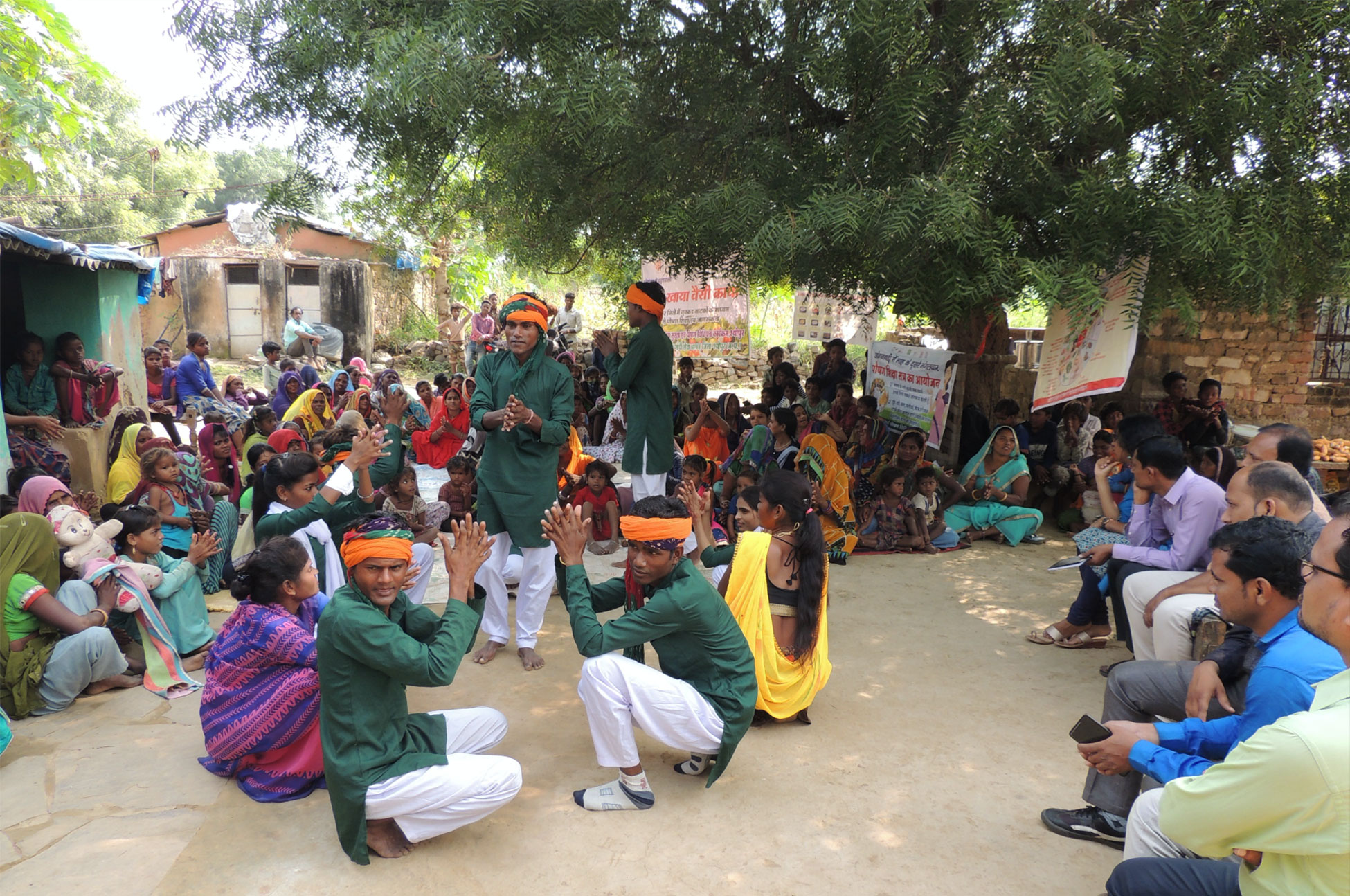
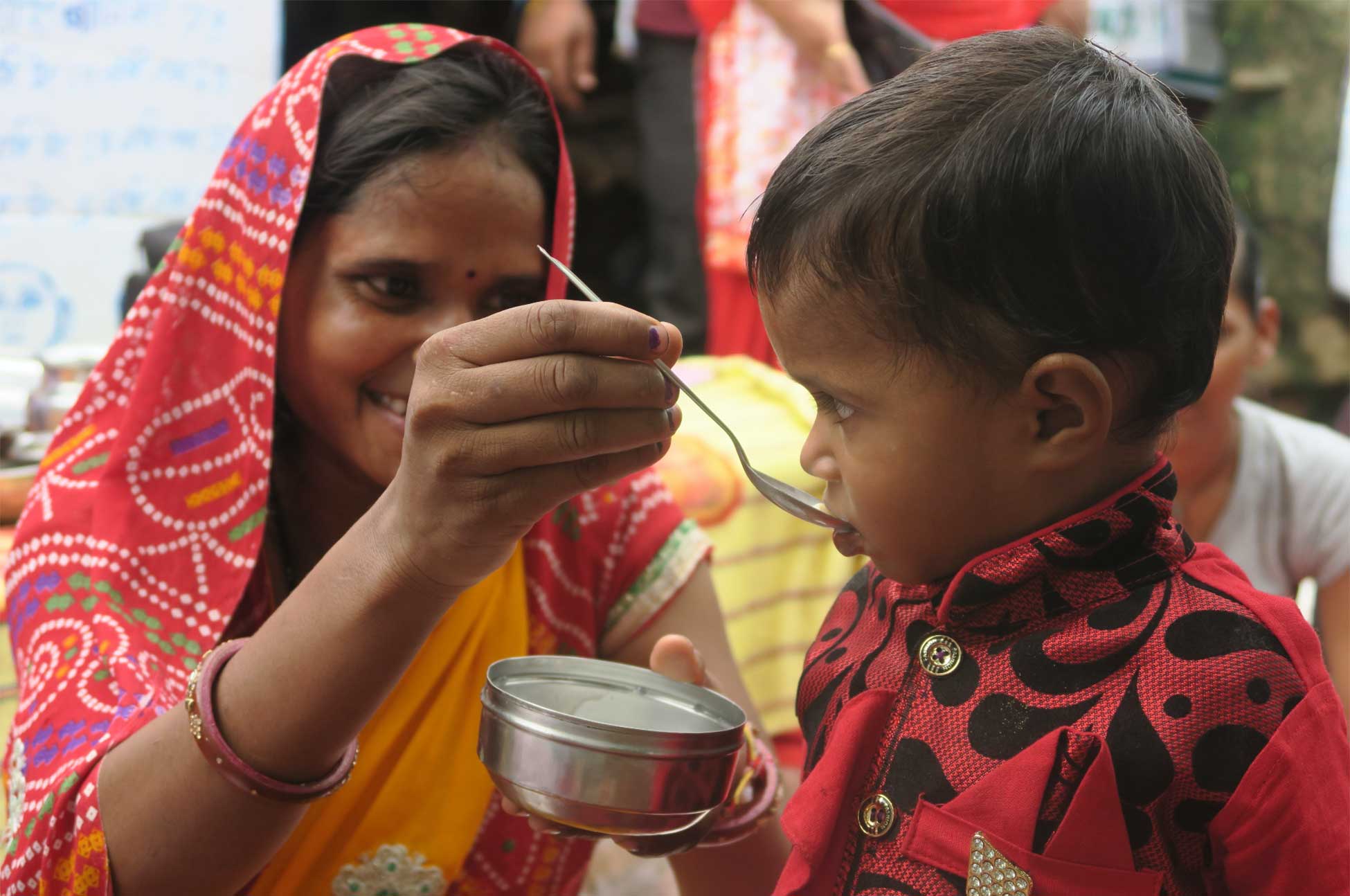


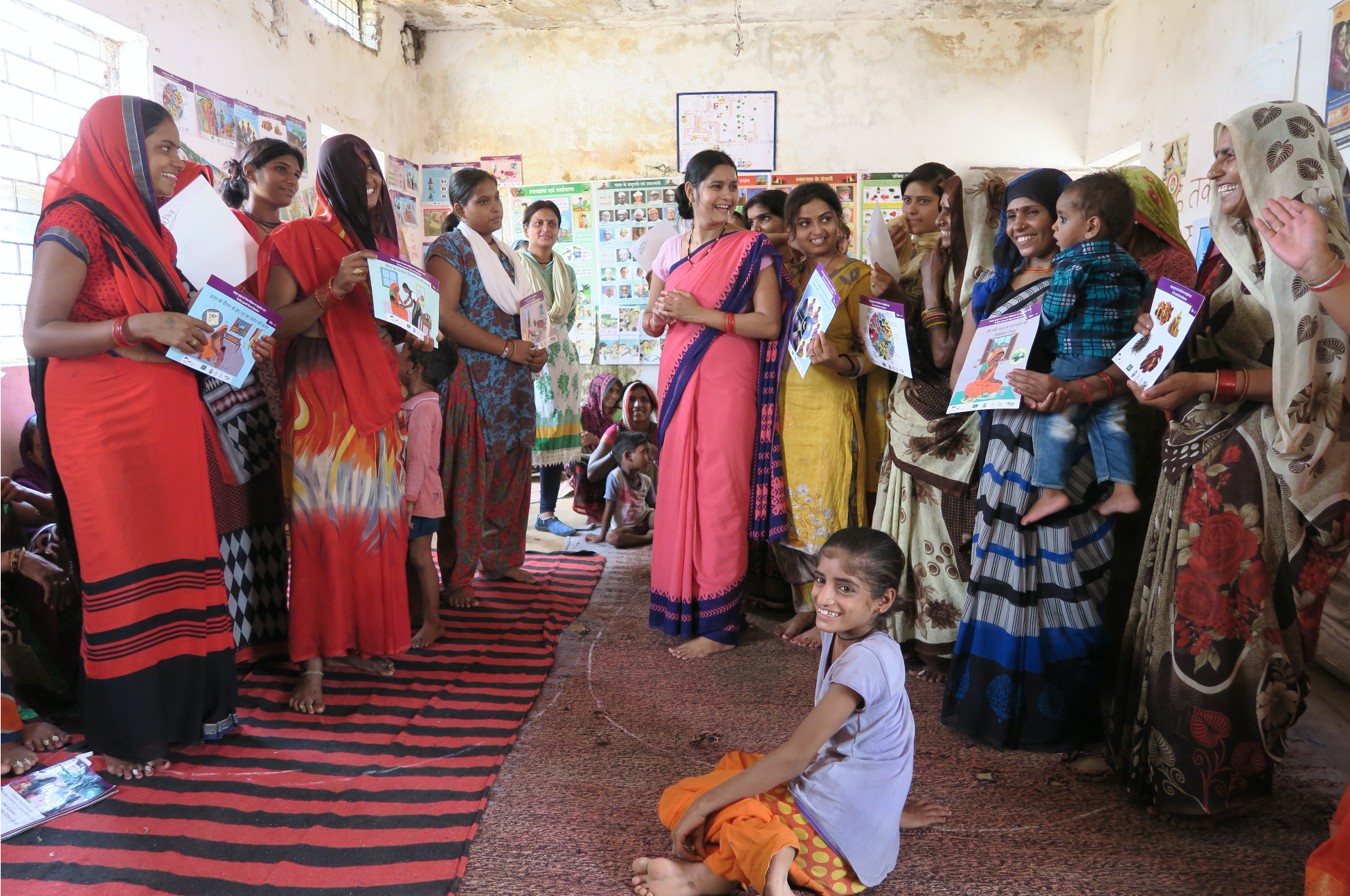
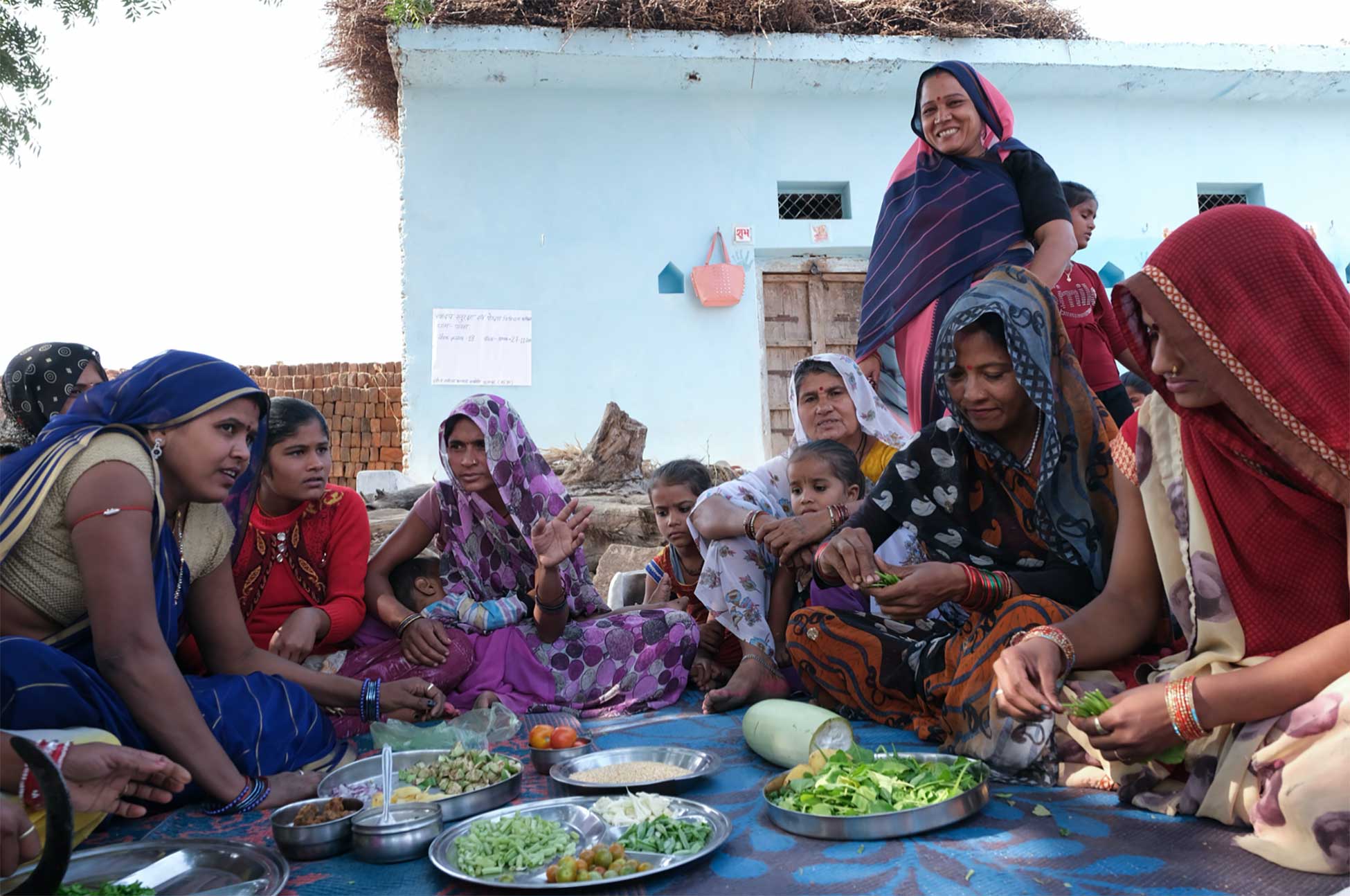
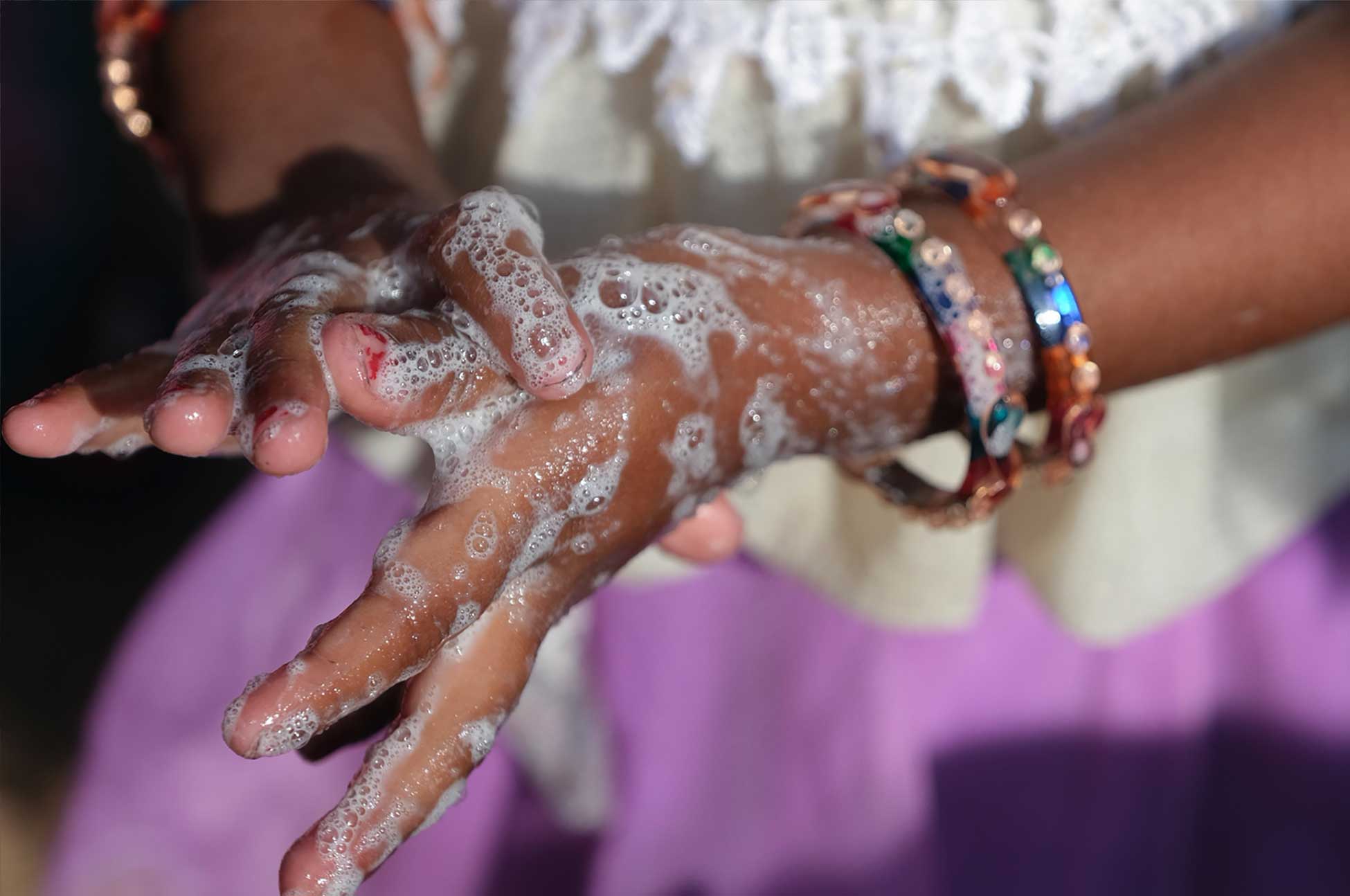

BEST PRACTICES AND TOOLS
- Empowering women with knowledge and practices on nutrition and hygiene: Nutrition Participatory Learning & Action (N-PLA) approach has been applied by AWWs in Sheopur and Chhatarpur districts of Madhya Pradesh to improve dietary diversity of women and young children. 3,025 Anganwadi Workers (AWW) have been trained in nutrition and hygiene education and 86% show increased competence. 144,000 women at reproductive age have been provided with practical knowledge on healthy nutrition and made aware of nutrition services, 82 % show increased competence.

- Community Nutrition Gardens (CNGs): The project piloted 20 Community Nutrition Gardens (CNGs) with 255 women from Women Self Help Groups on community land in Chhatarpur and Sheopur districts during last year to improve year-round availability and access to diverse and nutritious foods and economically empower women, who are organised in Self-Help Groups (SHG) with 12-15 members per CNG to maintain the gardens. Under MGNREGA, the women receive wages for garden maintenance and monetary incentives to take care of the plants. Furthermore, under MGNREGA and schemes from other line departments seeds and saplings are provided, irrigation infrastructure and fencing get funded and governmental agricultural experts are involved. This CNG approach has also contributed to improve local nutrition governance because it follows a multi-sectoral action and promotes convergence across local departments. MGNREGA has recently expressed demand to upscale the Community Nutrition Garden approach in all 52 districts in Madhya Pradesh.

- E-learning training platform: For the systematic capacity building of frontline workers, the project in collaboration with the DWCD in Madhya Pradesh has developed an innovative and interactive e-learning training platform. It reaches out to 97,135 AWWs and 3,575 Supervisors in Madhya Pradesh and aims to improve the counselling skills and knowledge of AWWs and their supervisors on nutrition-relevant topics. The digital platform consists of structured 40 hours self-paced learning content, covering seven modules consisting of 44 chapters. The e-learning platform has engaging visuals, quizzes, and narrations that uses simple Hindi. The platform has been integrated within the State Partner’s DWCD management information system (MIS) to ensure a standardized form of high-quality training with ownership of DWCD. This also offers an opportunity to track the learning status of enrolled AWWs across the state through a live dashboard. At the end of the training, a verified certificate by DWCD is provided to all successful learners. More than 25,000 AWW and supervisors have started e-Learning training, 7,700 have completed it.

SUCCESS STORIES
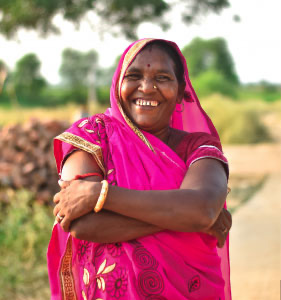 Ms Ramvati Adiwashi, “Game Changers – Women in Agriculture“ Award winner 2020
Ms Ramvati Adiwashi, “Game Changers – Women in Agriculture“ Award winner 2020
“With my small initiative, I motivate and mobilize other women to establish nutrition gardens and aware them about the importance of dietary diversity, hygiene practices through Tipi Tap, use of Matka Filter to get safe and clean drinking water. It gives me immense pleasure that this small initiative of creating nutrition garden is being appreciated nationally and internationally, and this will motivate me to continue my work. By this recognition, many more women will come forward from my community to join hands for a better future of our village.”
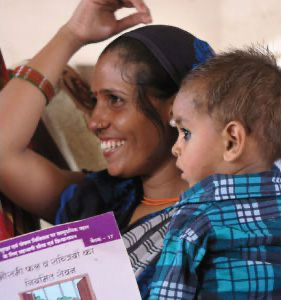
Neeta Yadav has been regularly taking part in nutrition education training in her village for two years. She says: “Through the trainings I have learned how important different food groups in family meals are for adequate nutrition. Now, for example, I add vegetables to rice and lentil dishes.”
Archana Awasthi has been the supervisor of 25 social workers for one year and motivates them to complete the e-Learning training. She says: “In digital learning, we can use animations and infographics to ensure that all important content is conveyed throughout the training and nothing is forgotten”.
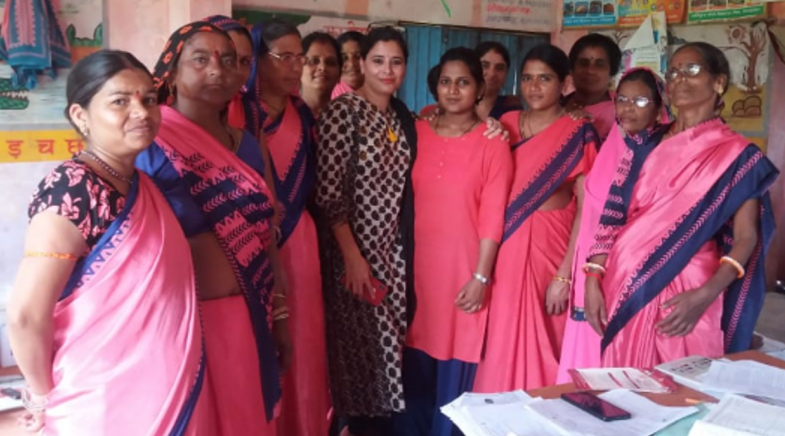
VIDEOS & LINKS
RECIPE VIDEOS
PUBLICATIONS
- A Portfolio Analysis Food Systems Transformation through Agroecology
- SENU factsheet_April 2024
- SENU NPLA Round 02 Module Marathi
- SENU NPLA Round 02 Module Hindi
- Research Brief 4/2022: Social Behaviour Change (SBC): From Knowledge to Action
- DWCD SBC Strategy Vol I
- DWCD SBC Strategy Vol II
- SENU SBC Strategy
- Upscaling of CNGs in Madhya Pradesh
- SENU Project Factsheet Hindi
- SENU NPLA Round 01 Module Hindi
- SENU NPLA Round 01 Module Marathi
- Research Brief 3/2022: How can Community and Homestead Nutrition Gardens in Madhya Pradesh, India become more climate resilient?
- Healthy recipes for important life phases: Nutritious local cuisine from Madhya Pradesh, India (English)
- Healthy recipes for important life phases: Nutritious local cuisine from Madhya Pradesh, India (Hindi)
- Research Brief 2/2022: From evidence to action: Towards a gender transformative approach in nutrition
- Research Brief 1/2022: The Influence of Community Nutrition Gardens on the Nutritional Situation of Women in Madhya Pradesh, India.
- Influence of Community Nutrition Gardens on Nutrition Situation of Women in Madhya Pradesh, Master Thesis Lisa Rueck
- Qualitative SBC Report
- Digital Photo Exhibition (Bonn)
- The Enablers and Barriers to Positive Nutrition Practices Formative Research Report, 2019
- Testimonials – Ernährungssicherung und Resilienzstärkung in Indien, 2019
- Muti-Country Resilience Study, 2019
EXTERNAL PUBLICATIONS
COUNTRY
India
DURATION
- Phase 2: 2021 – 2025
- Phase 1: 2015 – 2020
Commission Agency
BMZ

